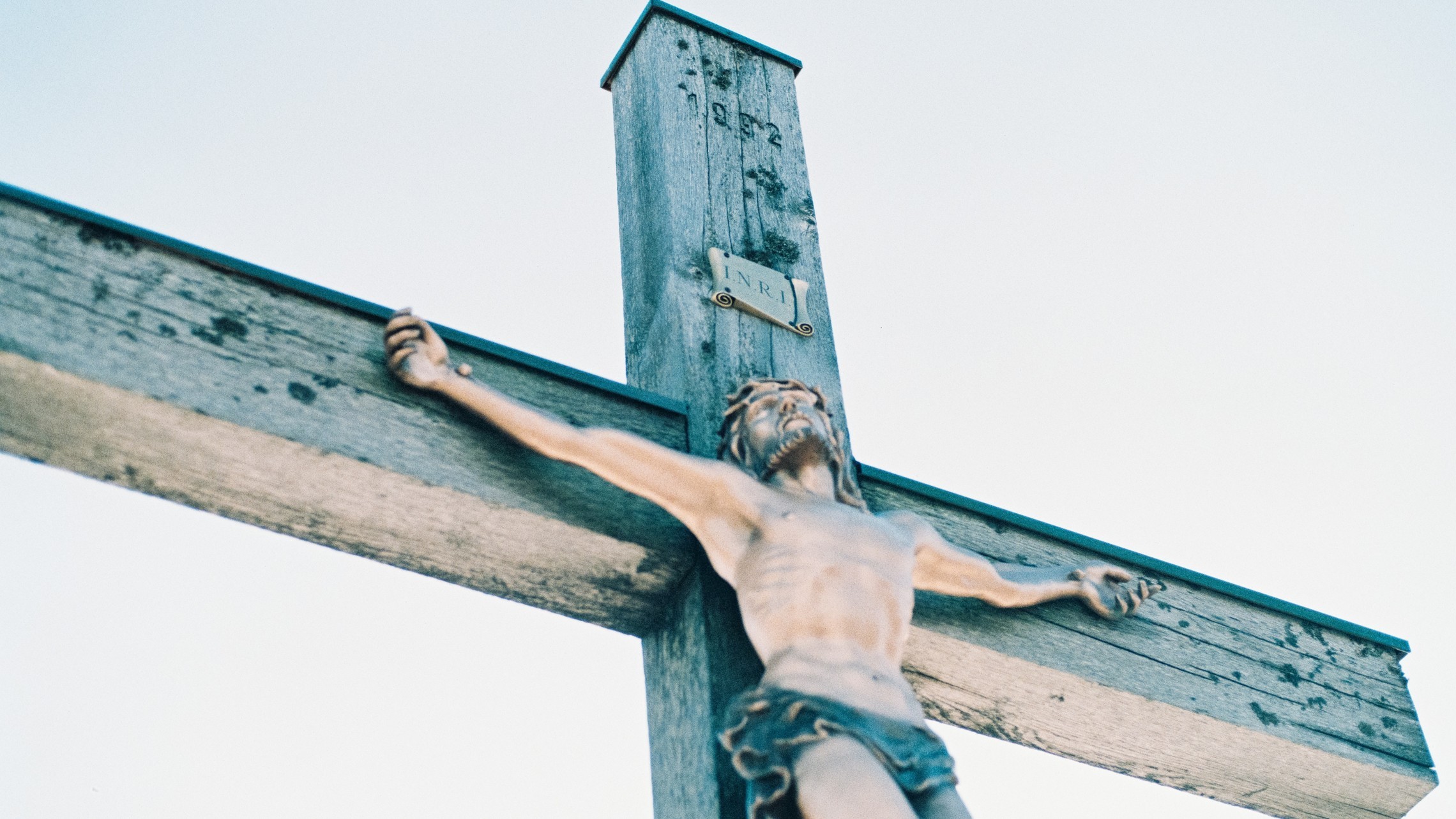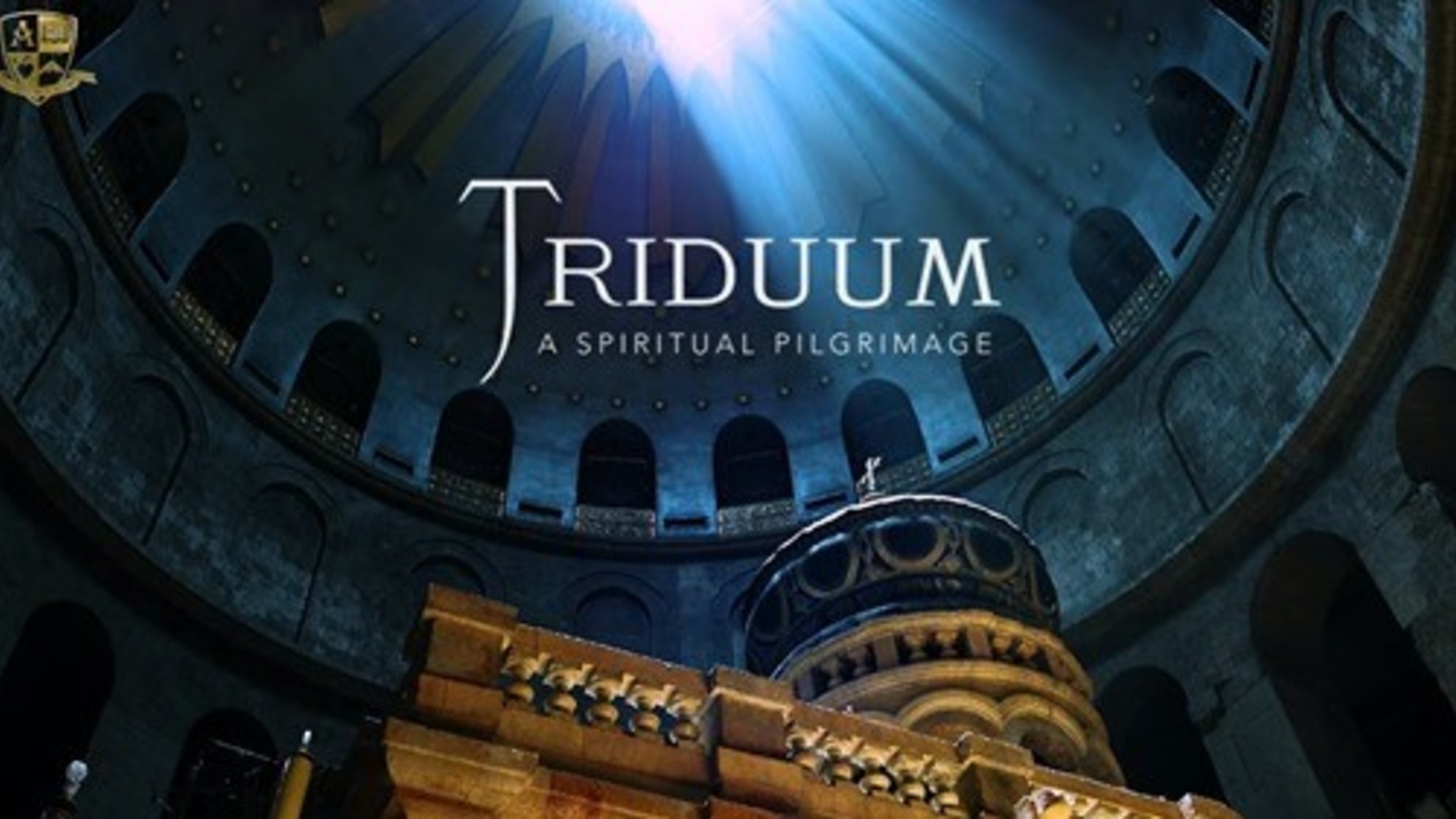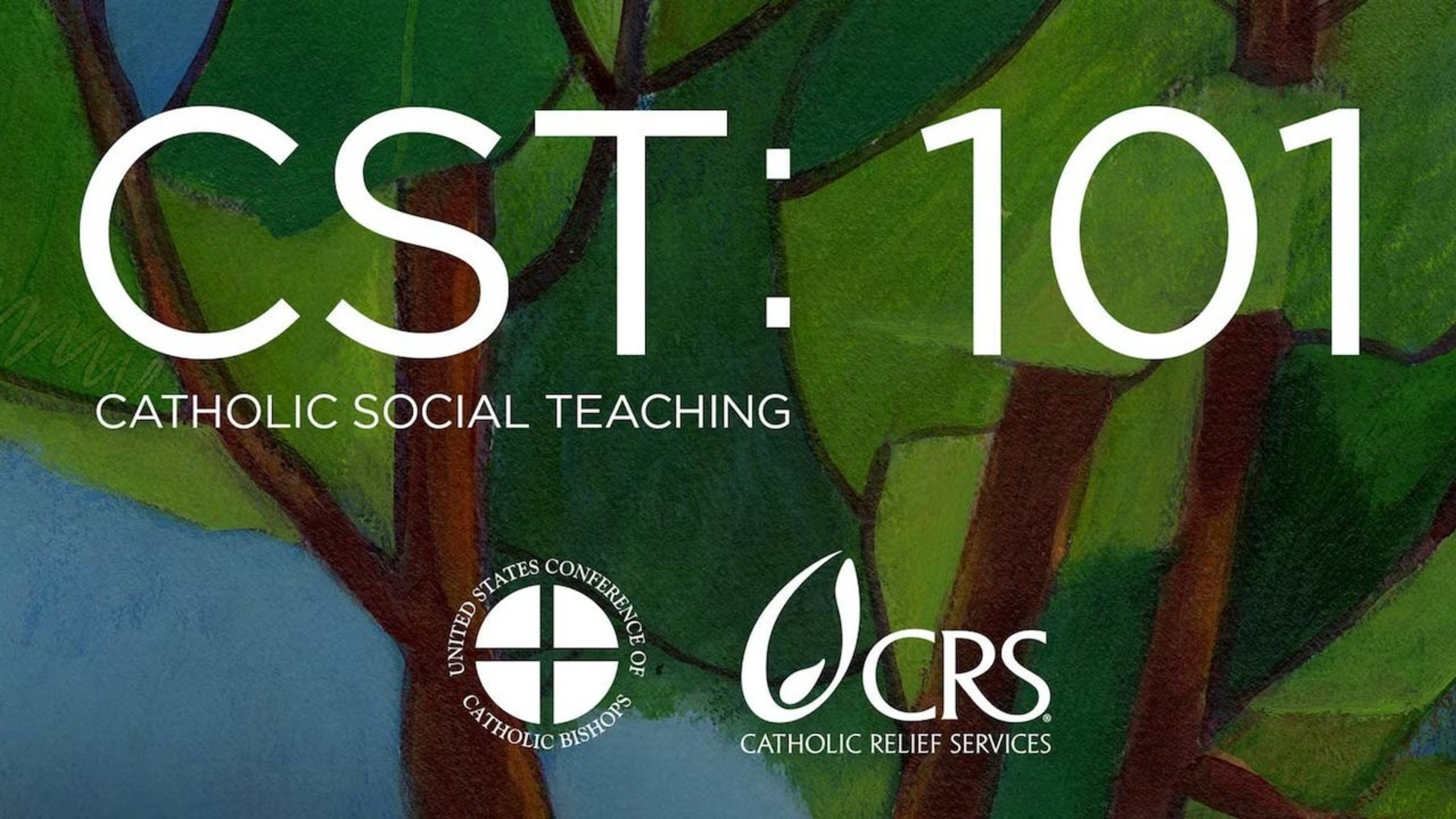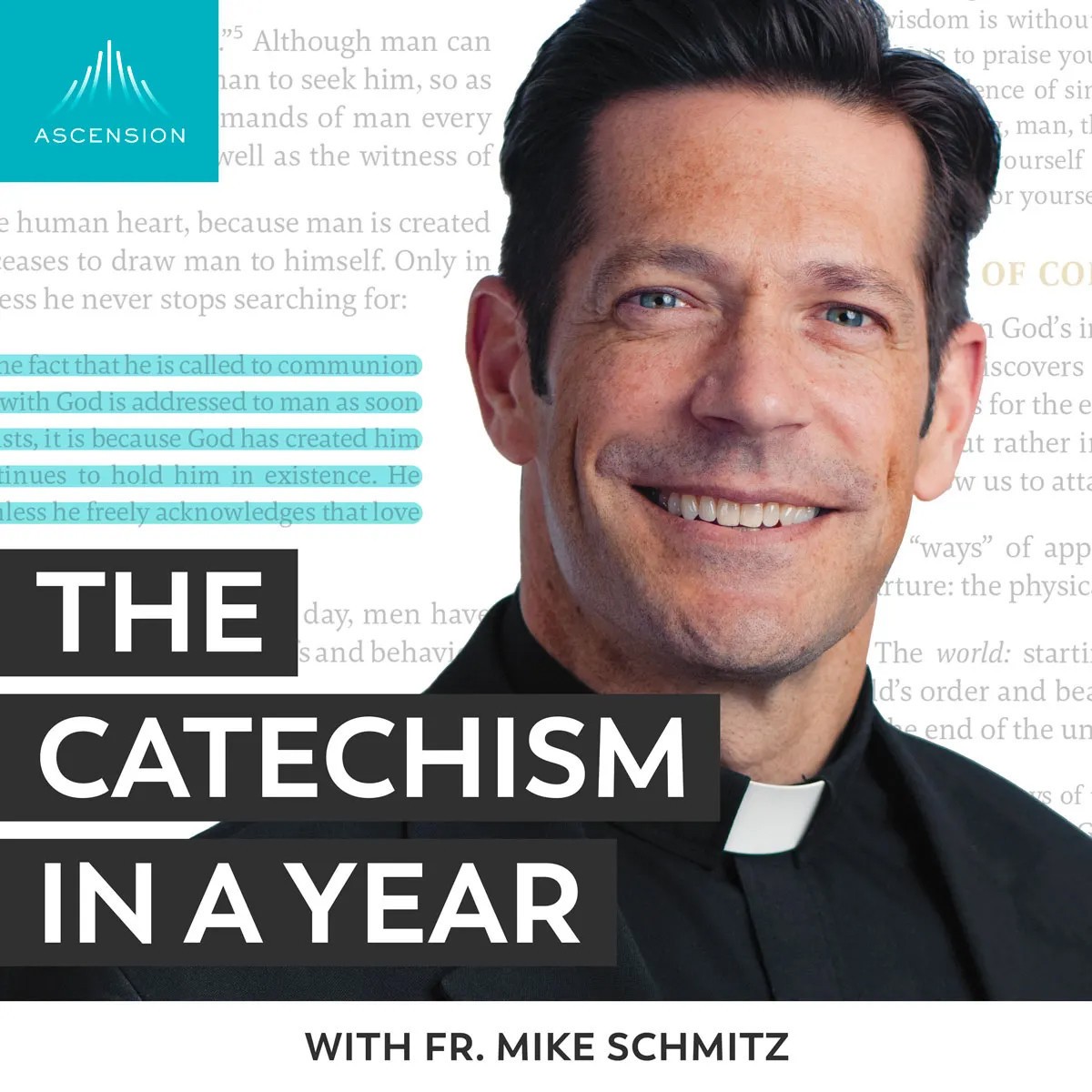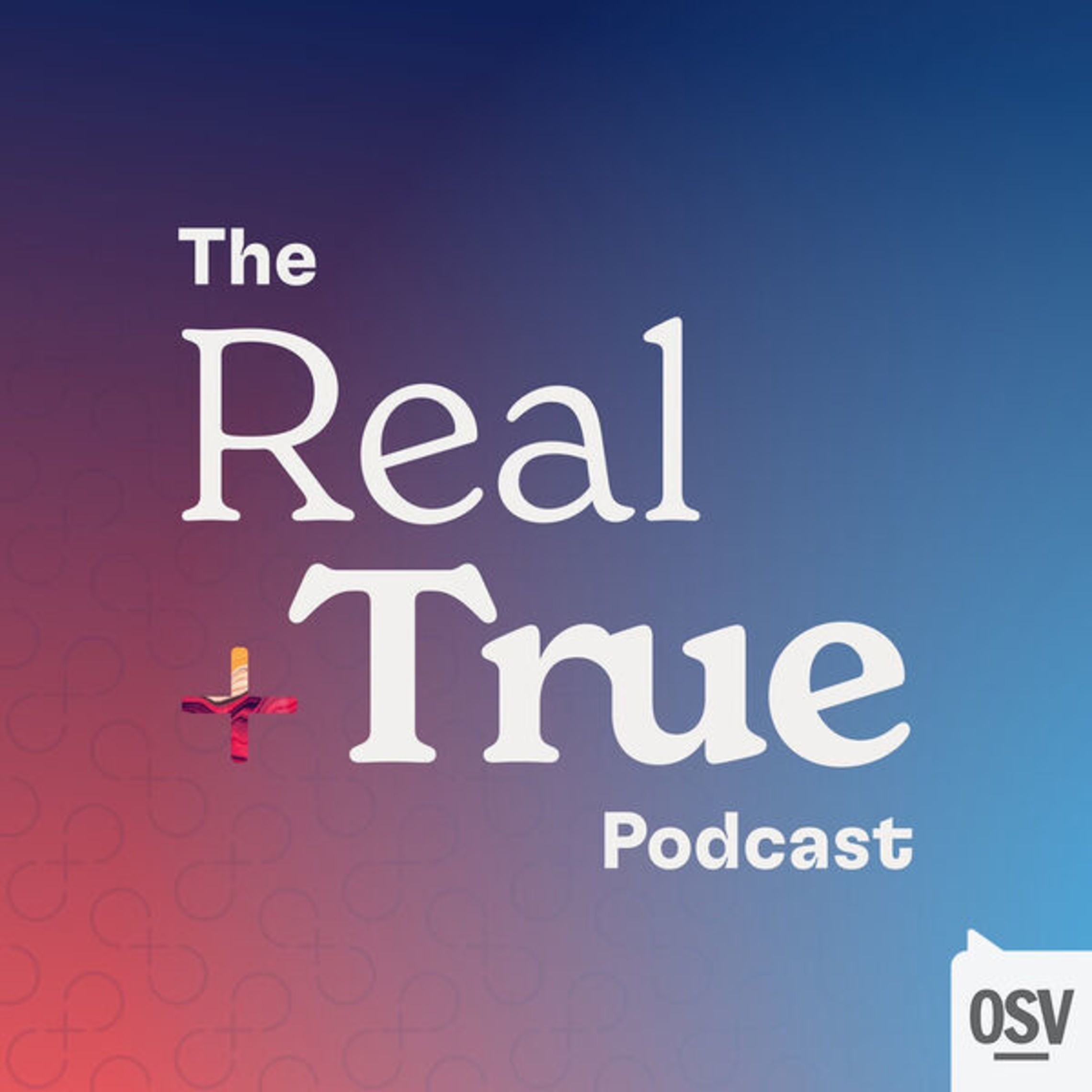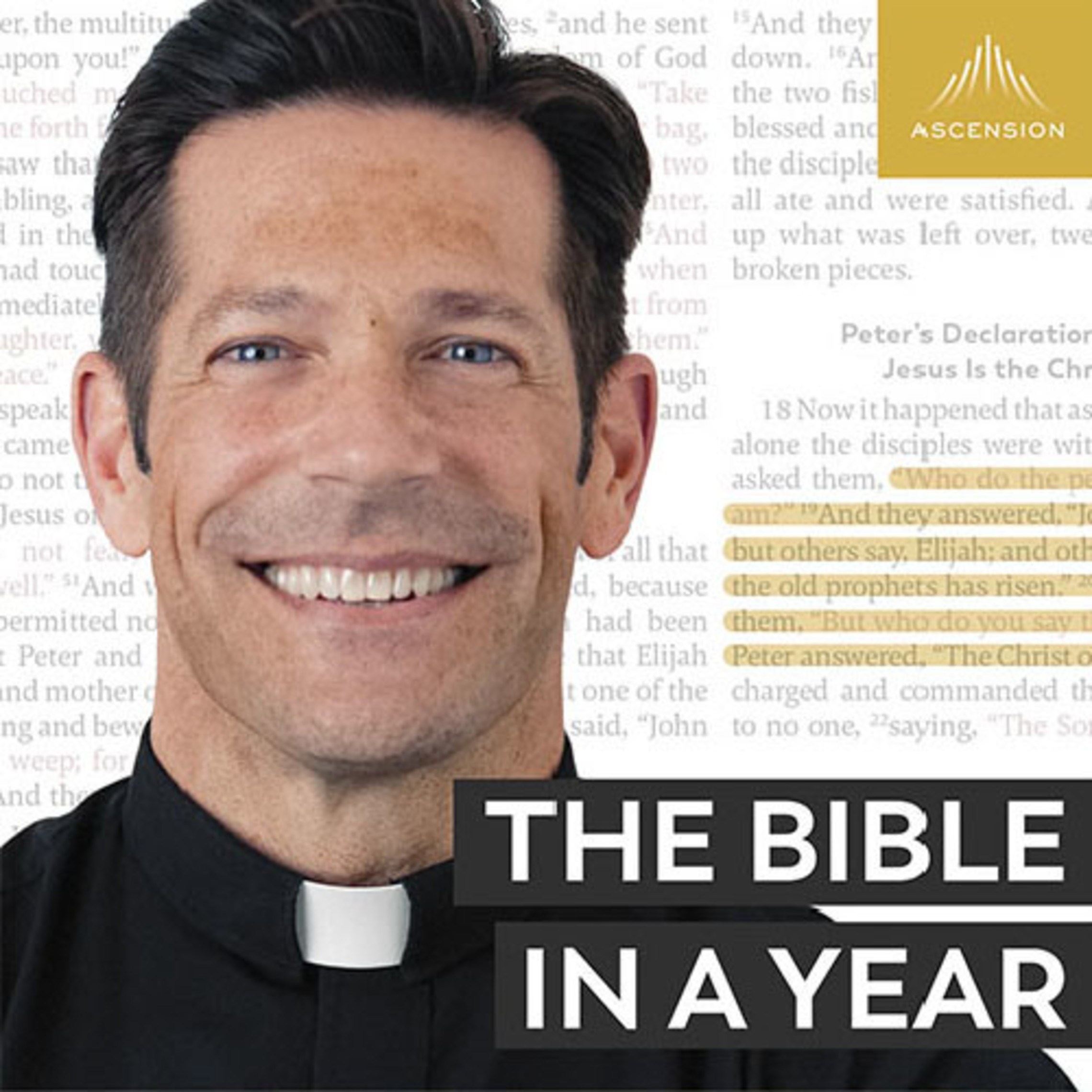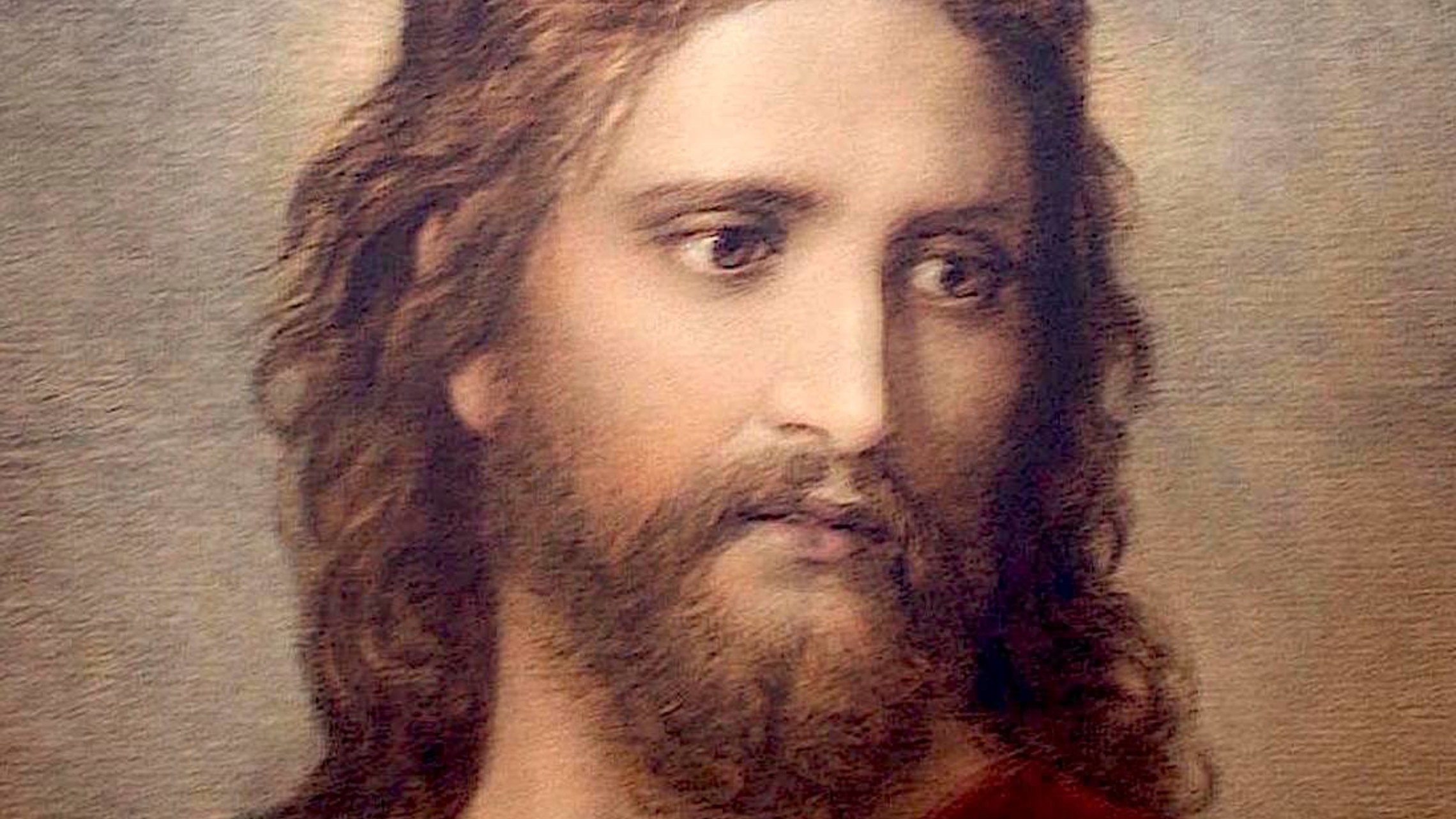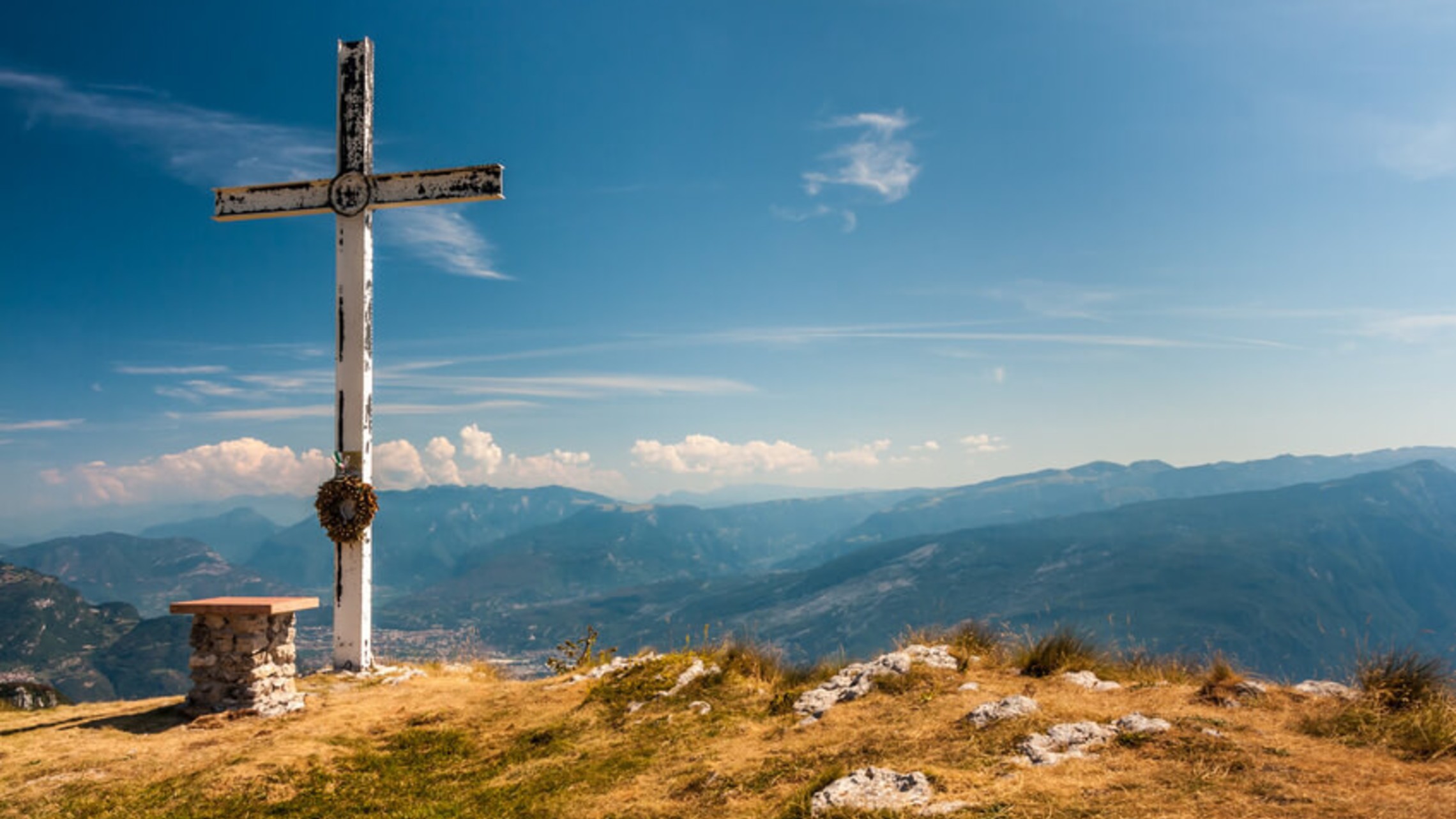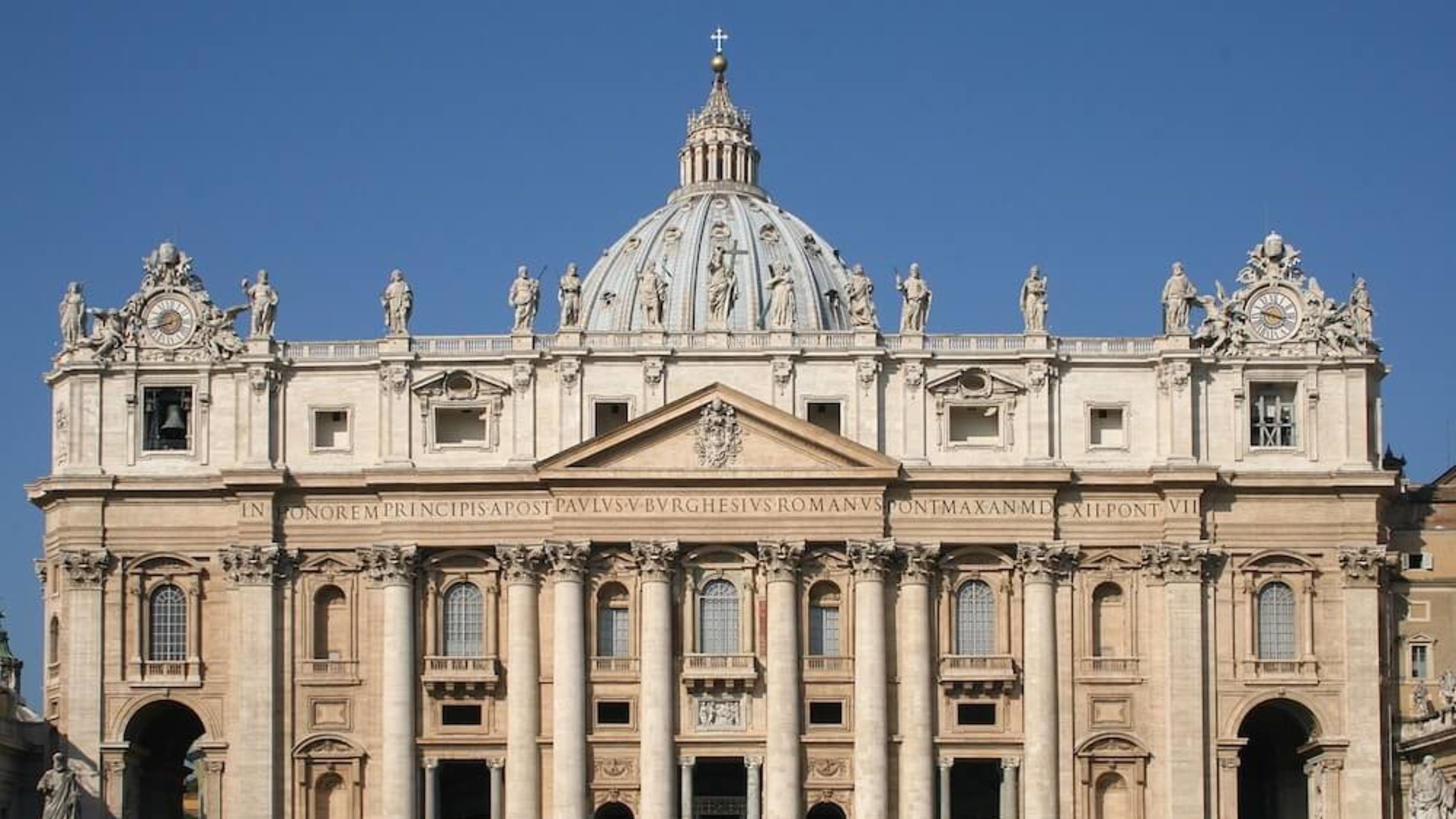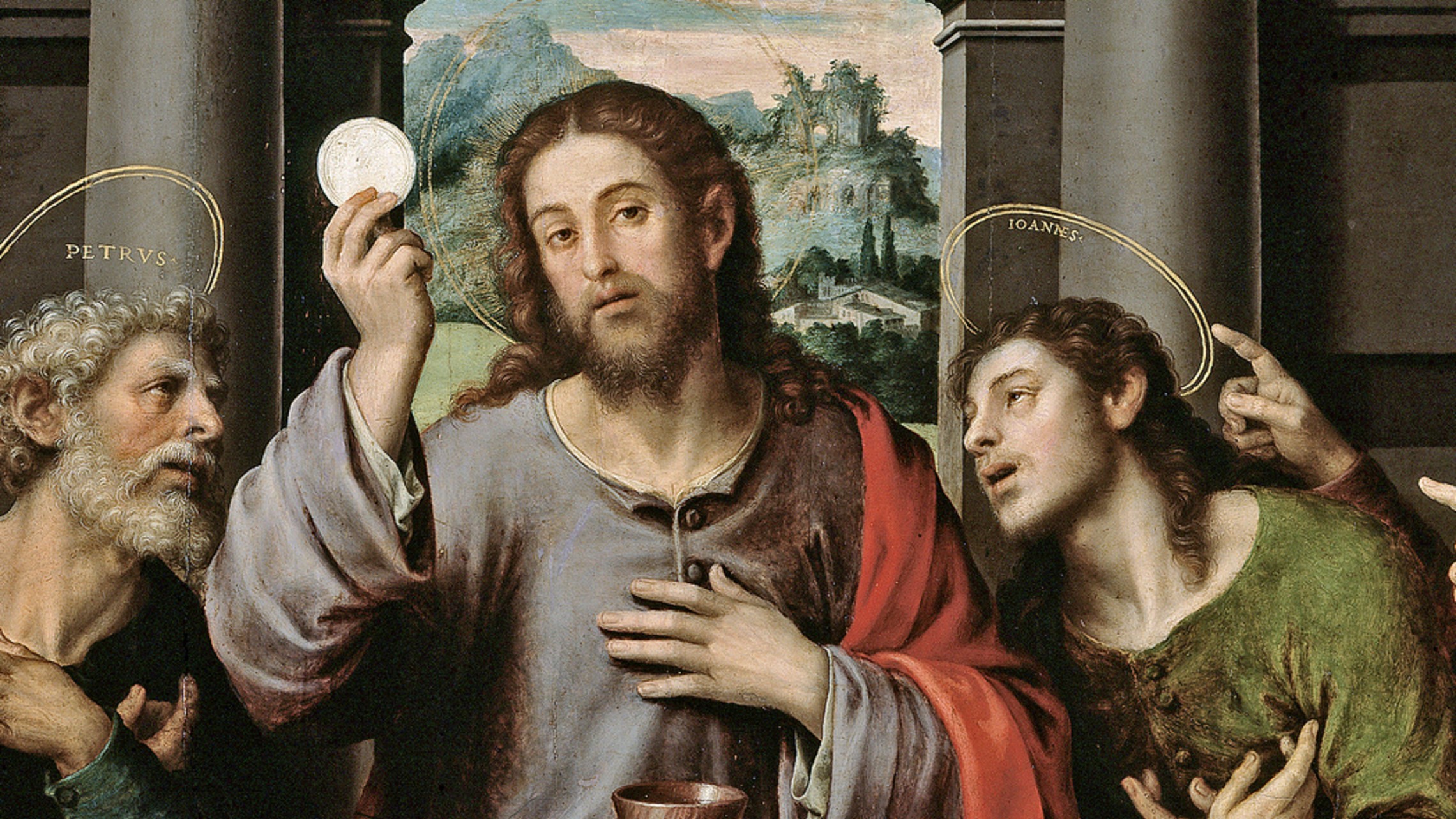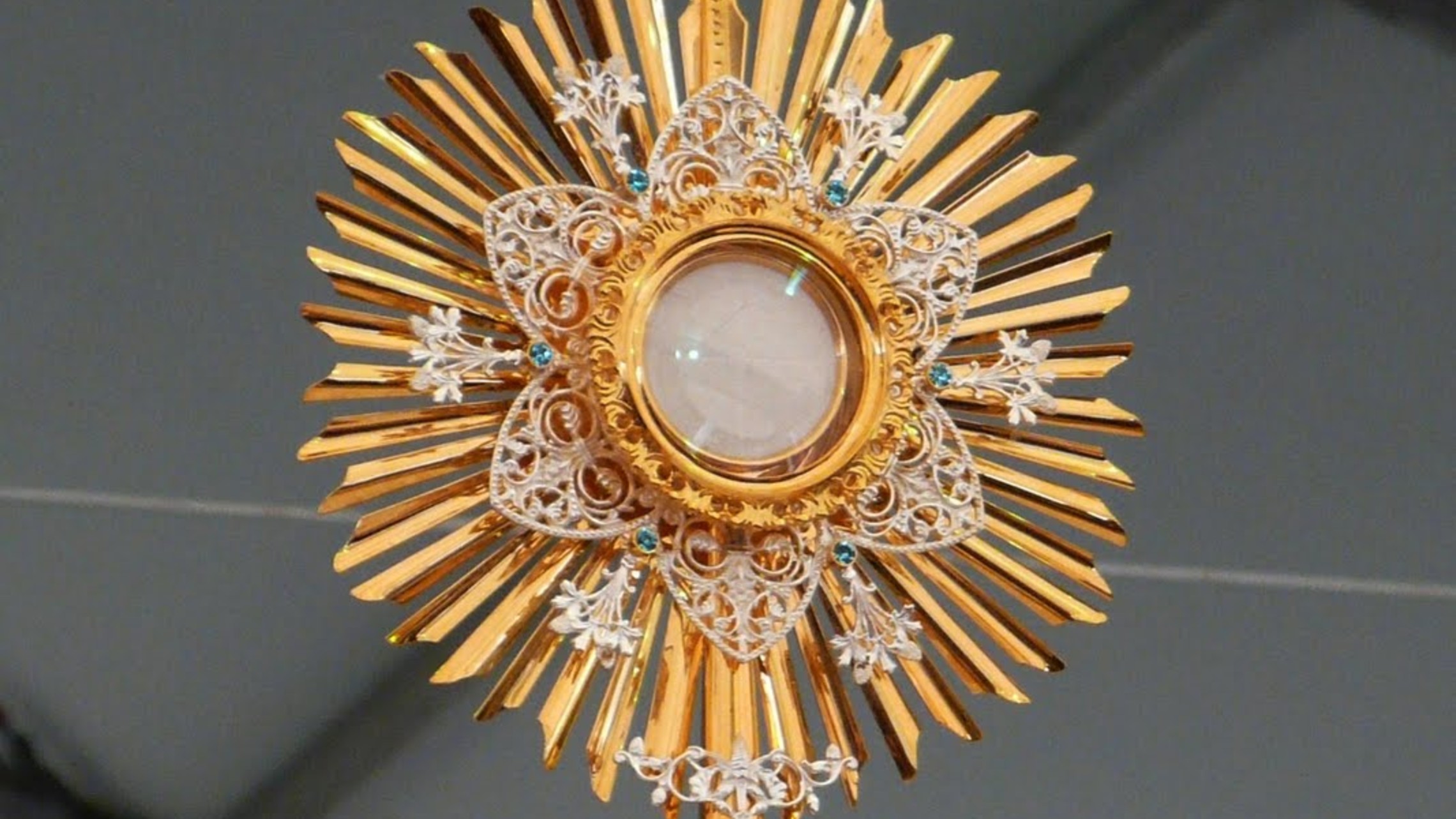Seasonal Resources
Any book which inspires us to lead a better life is a good book.
– Blessed Fulton Sheen
2024 National Eucharistic Congress Playlist
Featured Podcasts
Daily Readings
Brothers and sisters:
Owe nothing to anyone, except to love one another;
for the one who loves another has fulfilled the law.
The commandments, You shall not commit adultery;
you shall not kill;
you shall not steal;
you shall not covet,
and whatever other commandment there may be,
are summed up in this saying, namely,
You shall love your neighbor as yourself.
Love does no evil to the neighbor;
hence, love is the fulfillment of the law.
R. ( 5a) Blessed the man who is gracious and lends to those in need.
or:
R. Alleluia.
Blessed the man who fears the LORD,
who greatly delights in his commands.
His posterity shall be mighty upon the earth;
the upright generation shall be blessed.
R. Blessed the man who is gracious and lends to those in need.
or:
R. Alleluia.
He dawns through the darkness, a light for the upright;
he is gracious and merciful and just.
Well for the man who is gracious and lends,
who conducts his affairs with justice.
R. Blessed the man who is gracious and lends to those in need.
or:
R. Alleluia.
Lavishly he gives to the poor;
his generosity shall endure forever;
his horn shall be exalted in glory.
R. Blessed the man who is gracious and lends to those in need.
or:
R. Alleluia.
R. Alleluia, alleluia.
If you are insulted for the name of Christ, blessed are you,
for the Spirit of God rests upon you.
R. Alleluia, alleluia.
Great crowds were traveling with Jesus,
and he turned and addressed them,
"If anyone comes to me without hating his father and mother,
wife and children, brothers and sisters,
and even his own life,
he cannot be my disciple.
Whoever does not carry his own cross and come after me
cannot be my disciple.
Which of you wishing to construct a tower
does not first sit down and calculate the cost
to see if there is enough for its completion?
Otherwise, after laying the foundation
and finding himself unable to finish the work
the onlookers should laugh at him and say,
'This one began to build but did not have the resources to finish.'
Or what king marching into battle would not first sit down
and decide whether with ten thousand troops
he can successfully oppose another king
advancing upon him with twenty thousand troops?
But if not, while he is still far away,
he will send a delegation to ask for peace terms.
In the same way,
everyone of you who does not renounce all his possessions
cannot be my disciple."
Lectionary for Mass for Use in the Dioceses of the United States, second typical edition, Copyright © 2001, 1998, 1997, 1986, 1970 Confraternity of Christian Doctrine; Psalm refrain © 1968, 1981, 1997, International Committee on English in the Liturgy, Inc. All rights reserved. Neither this work nor any part of it may be reproduced, distributed, performed or displayed in any medium, including electronic or digital, without permission in writing from the copyright owner.
- Readings for the Memorial of Saint Charles Borromeo, Bishop
Brothers and sisters:
We, though many, are one Body in Christ
and individually parts of one another.
Since we have gifts that differ according to the grace given to us,
let us exercise them:
if prophecy, in proportion to the faith;
if ministry, in ministering;
if one is a teacher, in teaching;
if one exhorts, in exhortation;
if one contributes, in generosity;
if one is over others, with diligence;
if one does acts of mercy, with cheerfulness.
Let love be sincere;
hate what is evil,
hold on to what is good;
love one another with mutual affection;
anticipate one another in showing honor.
Do not grow slack in zeal,
be fervent in spirit,
serve the Lord.
Rejoice in hope,
endure in affliction,
persevere in prayer.
Contribute to the needs of the holy ones,
exercise hospitality.
Bless those who persecute you,
bless and do not curse them.
Rejoice with those who rejoice,
weep with those who weep.
Have the same regard for one another;
do not be haughty but associate with the lowly.
R. In you, O Lord, I have found my peace.
O LORD, my heart is not proud,
nor are my eyes haughty;
I busy not myself with great things,
nor with things too sublime for me.
R. In you, O Lord, I have found my peace.
Nay rather, I have stilled and quieted
my soul like a weaned child.
Like a weaned child on its mother's lap,
so is my soul within me.
R. In you, O Lord, I have found my peace.
O Israel, hope in the LORD,
both now and forever.
R. In you, O Lord, I have found my peace.
R. Alleluia, alleluia.
Come to me, all you who labor and are burdened,
and I will give you rest, says the Lord.
R. Alleluia, alleluia.
One of those at table with Jesus said to him,
"Blessed is the one who will dine in the Kingdom of God."
He replied to him,
"A man gave a great dinner to which he invited many.
When the time for the dinner came,
he dispatched his servant to say to those invited,
'Come, everything is now ready.'
But one by one, they all began to excuse themselves.
The first said to him,
'I have purchased a field and must go to examine it;
I ask you, consider me excused.'
And another said, 'I have purchased five yoke of oxen
and am on my way to evaluate them;
I ask you, consider me excused.'
And another said, 'I have just married a woman,
and therefore I cannot come.'
The servant went and reported this to his master.
Then the master of the house in a rage commanded his servant,
'Go out quickly into the streets and alleys of the town
and bring in here the poor and the crippled, the blind and the lame.'
The servant reported, 'Sir, your orders have been carried out
and still there is room.'
The master then ordered the servant,
'Go out to the highways and hedgerows
and make people come in that my home may be filled.
For, I tell you, none of those men who were invited will taste my dinner.'"
Lectionary for Mass for Use in the Dioceses of the United States, second typical edition, Copyright © 2001, 1998, 1997, 1986, 1970 Confraternity of Christian Doctrine; Psalm refrain © 1968, 1981, 1997, International Committee on English in the Liturgy, Inc. All rights reserved. Neither this work nor any part of it may be reproduced, distributed, performed or displayed in any medium, including electronic or digital, without permission in writing from the copyright owner.
Brothers and sisters:
The gifts and the call of God are irrevocable.
Just as you once disobeyed God
but have now received mercy
because of their disobedience,
so they have now disobeyed in order that,
by virtue of the mercy shown to you,
they too may now receive mercy.
For God delivered all to disobedience,
that he might have mercy upon all.
Oh, the depth of the riches and wisdom and knowledge of God!
How inscrutable are his judgments and how unsearchable his ways!
For who has known the mind of the Lord
or who has been his counselor?
Or who has given him anything
that he may be repaid?
For from him and through him and for him are all things.
To God be glory forever. Amen.
R. (14c) Lord, in your great love, answer me.
But I am afflicted and in pain;
let your saving help, O God, protect me.
I will praise the name of God in song,
and I will glorify him with thanksgiving.
R. Lord, in your great love, answer me.
"See, you lowly ones, and be glad;
you who seek God, may your hearts revive!
For the LORD hears the poor,
and his own who are in bonds he spurns not."
R. Lord, in your great love, answer me.
For God will save Zion
and rebuild the cities of Judah.
They shall dwell in the land and own it,
and the descendants of his servants shall inherit it,
and those who love his name shall inhabit it.
R. Lord, in your great love, answer me.
R. Alleluia, alleluia.
If you remain in my word, you will truly be my disciples,
and you will know the truth, says the Lord.
R. Alleluia, alleluia.
On a sabbath Jesus went to dine
at the home of one of the leading Pharisees.
He said to the host who invited him,
"When you hold a lunch or a dinner,
do not invite your friends or your brothers or sisters
or your relatives or your wealthy neighbors,
in case they may invite you back and you have repayment.
Rather, when you hold a banquet,
invite the poor, the crippled, the lame, the blind;
blessed indeed will you be because of their inability to repay you.
For you will be repaid at the resurrection of the righteous."
- Readings for the Optional Memorial of Saint Martin de Porres, Religious
Lectionary for Mass for Use in the Dioceses of the United States, second typical edition, Copyright © 2001, 1998, 1997, 1986, 1970 Confraternity of Christian Doctrine; Psalm refrain © 1968, 1981, 1997, International Committee on English in the Liturgy, Inc. All rights reserved. Neither this work nor any part of it may be reproduced, distributed, performed or displayed in any medium, including electronic or digital, without permission in writing from the copyright owner.
The following are a selection of the readings that may be chosen for this day.
Reading I Wisdom 3:1-9The souls of the just are in the hand of God,
and no torment shall touch them.
They seemed, in the view of the foolish, to be dead;
and their passing away was thought an affliction
and their going forth from us, utter destruction.
But they are in peace.
For if before men, indeed, they be punished,
yet is their hope full of immortality;
chastised a little, they shall be greatly blessed,
because God tried them
and found them worthy of himself.
As gold in the furnace, he proved them,
and as sacrificial offerings he took them to himself.
In the time of their visitation they shall shine,
and shall dart about as sparks through stubble;
they shall judge nations and rule over peoples,
and the Lord shall be their King forever.
Those who trust in him shall understand truth,
and the faithful shall abide with him in love:
because grace and mercy are with his holy ones,
and his care is with his elect.
R. (1) The Lord is my shepherd; there is nothing I shall want.
or:
R. Though I walk in the valley of darkness, I fear no evil, for you are with me.
The LORD is my shepherd; I shall not want.
In verdant pastures he gives me repose;
beside restful waters he leads me;
he refreshes my soul.
R. The Lord is my shepherd; there is nothing I shall want.
or:
R. Though I walk in the valley of darkness, I fear no evil, for you are with me.
He guides me in right paths
for his name’s sake.
Even though I walk in the dark valley
I fear no evil; for you are at my side
with your rod and your staff
that give me courage.
R. The Lord is my shepherd; there is nothing I shall want.
or:
R. Though I walk in the valley of darkness, I fear no evil, for you are with me.
You spread the table before me
in the sight of my foes;
You anoint my head with oil;
my cup overflows.
R. The Lord is my shepherd; there is nothing I shall want.
or:
R. Though I walk in the valley of darkness, I fear no evil, for you are with me.
Only goodness and kindness follow me
all the days of my life;
and I shall dwell in the house of the LORD
for years to come.
R. The Lord is my shepherd; there is nothing I shall want.
or:
R. Though I walk in the valley of darkness, I fear no evil, for you are with me.
Brothers and sisters:
Hope does not disappoint,
because the love of God has been poured out into our hearts
through the Holy Spirit who has been given to us.
For Christ, while we were still helpless,
died at the appointed time for the ungodly.
Indeed, only with difficulty does one die for a just person,
though perhaps for a good person
one might even find courage to die.
But God proves his love for us
in that while we were still sinners Christ died for us.
How much more then, since we are now justified by his Blood,
will we be saved through him from the wrath.
Indeed, if, while we were enemies,
we were reconciled to God through the death of his Son,
how much more, once reconciled,
will we be saved by his life.
Not only that,
but we also boast of God through our Lord Jesus Christ,
through whom we have now received reconciliation.
Brothers and sisters:
Are you unaware that we who were baptized into Christ Jesus
were baptized into his death?
We were indeed buried with him through baptism into death,
so that, just as Christ was raised from the dead
by the glory of the Father,
we too might live in newness of life.
For if we have grown into union with him through a death like his,
we shall also be united with him in the resurrection.
We know that our old self was crucified with him,
so that our sinful body might be done away with,
that we might no longer be in slavery to sin.
For a dead person has been absolved from sin.
If, then, we have died with Christ,
we believe that we shall also live with him.
We know that Christ, raised from the dead, dies no more;
death no longer has power over him.
R. Alleluia, alleluia.
Come, you who are blessed by my Father;
inherit the Kingdom prepared for you from the foundation of the world.
R. Alleluia, alleluia.
Jesus said to the crowds:
“Everything that the Father gives me will come to me,
and I will not reject anyone who comes to me,
because I came down from heaven not to do my own will
but the will of the one who sent me.
And this is the will of the one who sent me,
that I should not lose anything of what he gave me,
but that I should raise it on the last day.
For this is the will of my Father,
that everyone who sees the Son and believes in him
may have eternal life,
and I shall raise him on the last day.”
Lectionary for Mass for Use in the Dioceses of the United States, second typical edition, Copyright © 2001, 1998, 1997, 1986, 1970 Confraternity of Christian Doctrine; Psalm refrain © 1968, 1981, 1997, International Committee on English in the Liturgy, Inc. All rights reserved. Neither this work nor any part of it may be reproduced, distributed, performed or displayed in any medium, including electronic or digital, without permission in writing from the copyright owner.
I, John, saw another angel come up from the East,
holding the seal of the living God.
He cried out in a loud voice to the four angels
who were given power to damage the land and the sea,
"Do not damage the land or the sea or the trees
until we put the seal on the foreheads of the servants of our God."
I heard the number of those who had been marked with the seal,
one hundred and forty-four thousand marked
from every tribe of the children of Israel.
After this I had a vision of a great multitude,
which no one could count,
from every nation, race, people, and tongue.
They stood before the throne and before the Lamb,
wearing white robes and holding palm branches in their hands.
They cried out in a loud voice:
"Salvation comes from our God, who is seated on the throne,
and from the Lamb."
All the angels stood around the throne
and around the elders and the four living creatures.
They prostrated themselves before the throne,
worshiped God, and exclaimed:
"Amen. Blessing and glory, wisdom and thanksgiving,
honor, power, and might
be to our God forever and ever. Amen."
Then one of the elders spoke up and said to me,
"Who are these wearing white robes, and where did they come from?"
I said to him, "My lord, you are the one who knows."
He said to me,
"These are the ones who have survived the time of great distress;
they have washed their robes
and made them white in the Blood of the Lamb."
R. (see 6) Lord, this is the people that longs to see your face.
The LORD's are the earth and its fullness;
the world and those who dwell in it.
For he founded it upon the seas
and established it upon the rivers.
R. Lord, this is the people that longs to see your face.
Who can ascend the mountain of the LORD?
or who may stand in his holy place?
One whose hands are sinless, whose heart is clean,
who desires not what is vain.
R. Lord, this is the people that longs to see your face.
He shall receive a blessing from the LORD,
a reward from God his savior.
Such is the race that seeks him,
that seeks the face of the God of Jacob.
R. Lord, this is the people that longs to see your face.
Beloved:
See what love the Father has bestowed on us
that we may be called the children of God.
Yet so we are.
The reason the world does not know us
is that it did not know him.
Beloved, we are God's children now;
what we shall be has not yet been revealed.
We do know that when it is revealed we shall be like him,
for we shall see him as he is.
Everyone who has this hope based on him makes himself pure,
as he is pure.
R. Alleluia, alleluia.
Come to me, all you who labor and are burdened,
And I will give you rest, says the Lord.
R. Alleluia, alleluia.
When Jesus saw the crowds, he went up the mountain,
and after he had sat down, his disciples came to him.
He began to teach them, saying:
"Blessed are the poor in spirit,
for theirs is the Kingdom of heaven.
Blessed are they who mourn,
for they will be comforted.
Blessed are the meek,
for they will inherit the land.
Blessed are they who hunger and thirst for righteousness,
for they will be satisfied.
Blessed are the merciful,
for they will be shown mercy.
Blessed are the clean of heart,
for they will see God.
Blessed are the peacemakers,
for they will be called children of God.
Blessed are they who are persecuted for the sake of righteousness,
for theirs is the Kingdom of heaven.
Blessed are you when they insult you and persecute you
and utter every kind of evil against you falsely because of me.
Rejoice and be glad,
for your reward will be great in heaven."
Lectionary for Mass for Use in the Dioceses of the United States, second typical edition, Copyright © 2001, 1998, 1997, 1986, 1970 Confraternity of Christian Doctrine; Psalm refrain © 1968, 1981, 1997, International Committee on English in the Liturgy, Inc. All rights reserved. Neither this work nor any part of it may be reproduced, distributed, performed or displayed in any medium, including electronic or digital, without permission in writing from the copyright owner.
Saint of the Day
 St. Oswald
St. Oswald
Feast date: Feb 29
St. Oswald was a king of Northumbria from 634 until his death and is venerated as a saint.
Oswald spread the Christian faith throughout Northumbria. He had a cult following, and was generous with the poor.
There are many legends surrounding his reign.
 St. Joan of Arc
St. Joan of Arc
Feast date: May 30
Today is the feast of St. Joan of Arc, the patroness of France. Joan was born to a peasant family in Champagne, France in the early 15th century.
From a young age she heard the voices of St. Michael, St. Catherine, and St. Margaret speaking to her. Then, in 1428, when she was 13 years old, she received a vision telling her to go to the King of France and help him reconquer his kingdom from the invading forces of England and Burgundy.
Overcoming opposition and convincing members of the court and of the Church, she was given a small army. She charged into battle bearing a banner which bore the names “Jesus” and “Mary” as well as a symbol of the Holy Spirit.
Due to her leadership and trust in God, she was able to raise the siege of Orleans in 1429. Joan and her army went on to win a series of battles. Because of her efforts, the king was able to enter Rheims. He was crowned with Joan at his side.
Eventually, Joan was captured by the forces of Burgundy in May of 1430. When her own king and army did nothing to save her, she was sold to the English. She was imprisoned for a time and then put on trial. Bishop Peter Cauchon of Beauvais presided over her trial. His hope was that in being harsh with Joan, the English would help him become archbishop.
Joan was condemned to death on counts of heresy, witchcraft, and adultery. On May 30, 1431, she was burned at the stake in Rouen, France. She was 19 years old.
Thirty years after her death, her case was retried and she was exonerated. In 1920, she was canonized by Pope Benedict XV. She is the patroness of France, captives, soldiers, and those ridiculed for their piety.
 St. Gianna Beretta Molla
St. Gianna Beretta Molla
Feast date: Apr 28
Gianna Beretta Molla was born on October 4, 1922 in Magenta, Italy. She was the tenth of 13 children in her family. She grew up in a devout Catholic home and quickly learned the value of prayer. As a young adult, she joined the Society of Saint Vincent de Paul.
Gianna began to study medicine during World War II. In 1950 she opened her own medical office in Mesero, which was near her hometown. A couple years later she began to specialize in pediatrics and was drawn towards mothers, babies, the elderly, and the poor.
In 1954 Gianna met Pietro Molla, an engineer who worked in her office. In September of 1955 the two became husband and wife. Between 1956 and 1959 the couple had three children, Pierluigi, Maria Zita and Laura.
Gianna embraced the vocation of being a wife and mother with all her being and completely dedicated herself to "forming a truly Christian family."
In 1961, Gianna became pregnant with their fourth child. It was during this pregnancy that doctors discovered that Gianna had developed a uterine tumor.
The doctors gave her three choices: an abortion, which would save her life and allow her to have more children but take the life of her baby; a complete hysterectomy, which would save her life but prevent her from having more children and take her baby’s life; or removal of the fibroma only, which posed the risk of future complications but could save the life of her baby.
Gianna chose to have only the tumor removed. She was willing to lose her life for the sake of her baby’s. She knew that she may not make it through delivery, but she made it very clear that if a choice needed to be made between saving her own life or the child’s, the child needed to be saved.
Throughout her pregnancy, Gianna found strength in the Lord and asked him to take any pain away from the child.
On April 21, 1962 Gianna Emmanuel Molla was successfully delivered by Cesarean section. However, after complications arose with the tumor, Gianna passed away 7 days later on April 28.
Gianna was beatified by Saint Pope John Paul II on April 24, 1994 and canonized as a saint on May 16, 2004. Her husband and children attended her canonization.
During her canonization, Saint Pope John Paul II said, “Shortly before her wedding, in a letter to her future husband, she wrote: "Love is the most beautiful sentiment that the Lord has placed in the spirit of men.”
“Following the example of Christ, who ‘having loved his own ... he loved them to the end’ (John 13:1) this holy mother of a family was heroically faithful to the commitment she took on the day of her marriage. The supreme sacrifice that sealed her life testifies that only the one who has the courage to give himself totally to God and to neighbor finds fulfillment,” he added.
The pope described her as, "a simple, but more than ever, significant messenger of divine love."
St. Gianna Beretta Molla is the patron saint of mothers, physicians, and unborn children.
 St. Robert Southwell
St. Robert Southwell
Feast date: Feb 21
Saint Robert Southwell, SJ (c. 1561 – February 21 1595,) an English Roman Catholic Jesuit priest, is one of the 40 martyrs of England & Wales murdered during the English anti-Catholic Reformation.
Robert was born in Norfolk, the youngest of eight children in a well-to-do family with Catholic sympathies in the midts of the anti-Catholic sentiment started by the Anglican reformation.
In 1576, he was sent to France to study with the Jesuits at the English college at Douai. After completing his education, he requested to join the Society of Jesus, but was rejected because he was too young and the Jesuit seminary was temporarily closed because of the growing confrontations between French and Spanish forces.
But in a show of his conviction, in 1578, set off on foot to Rome to make his case for becoming a Jesuit.
After being admitted to the probation house of Sant' Andrea on 17 October 1578, and after the completion of the novitiate, Southwell began studies in philosophy and theology at the Jesuit College in Rome, and was ordained in 1584.That same year, Queen Elizabeth had passed an edict establishing the death penalty for any British Catholic priest or religious who joined a religious order abroad to remain in England longer than forty days.
Two years later, Southwell requested to be sent back to England as a clandestine Jesuit missionary with Henry Garnet.
Southwell preached and ministered successfully for six years, publishing Catholic catechism and writing spiritual poetry that would make him one of the most important Barroque English poets.
But the Queen's cheif priest-hunter, Richard Topcliffe, pressured a young Catholic woman he had raped to betray Southwell. Once captured, he was initially jailed in Topcliffe's personal prison and tortured 13 different times, trying to get him to name Catholic families involved in the clandestine Catholic mission. Fr. Robert did not betray a single name.
Transferred to the infamous Tower of London, Southwell endured cold and solitude for two and a half years, reading the Bible, the works of St. Bernard and praying the Breviary. During that time he also wrote the most important portion of his poetry.
In 1595, Southwell was finally put on trial accused of treason. During the trial, he admitted being a Jesuit to minister to Catholics, but strongly denied ever being involved in “designs or plots against the queen or kingdom."
After the predictable guilty verdict, he was sentenced to be hanged, drawn and quartered.
On 21 February 1595, in Tyburn, the Jesuit was allowed to address the crowd about his mission as a Catholic priest, then pronounced the words of Psalm 30 prayed in Complines: in manus tuas commendabo spiritum meum (Into your hands i commend my spirit) and made the sign of the cross.
After he was hanged and his severed head presented to the crowd, the traditional shout of “traitor” was replaced by utter silence.
Soon after his martyrdom, his body of poetry started to circulate in manuscripts among Catholics, and later in 1595 his “St Peter's Complaint” and other poems were printed. By 1636, 14 editions had been printed, and other collections of poems, including “Mary Magdalen's Funeral Tears” and Maeoniae.
Southwell was canonized in 1970 as one of the Forty Martyrs of England and Wales.
Many critics believe that the poem that expresses the best of his dramatic message to his fellow persecuted Catholics in England is “Life is But Losse,” which he wrote in prison:
By force I live, in will I wish to dye;
In playnte I passe the length of lingring dayes;
Free would my soule from mortall body flye,
And tredd the track of death's desyred waies:
Life is but losse where death is deemed gaine,
And loathed pleasures breed displeasinge payne.
.....
Come, cruell death, why lingrest thou so longe?
What doth withould thy dynte from fatall stroke?
Nowe prest I am, alas! thou dost me wronge,
To lett me live, more anger to provoke:
Thy right is had when thou hast stopt my breathe,
Why shouldst thoue stay to worke my dooble deathe?
.....
Avaunt, O viper! I thy spite defye:
There is a God that overrules thy force,
Who can thy weapons to His will applie,
And shorten or prolonge our brittle course.
I on His mercy, not thy might, relye;
To Him I live, for Him I hope to die.
 Blessed Santiago Alberione
Blessed Santiago Alberione
Feast date: Nov 26
Santiago Alberione was born on April 4, 1884, the fourth of six children in a devout working class family in San Lorenzo di Fossano, Cuneo, Italy. From a young age, he felt God calling him, and on his first school when the teacher asked him what he wanted to be when he grew up, he responded, “I want to be a priest.”This desire of his came true when he entered the seminary in Alba. During the night of December 31 1900 to January 1 1901 while still in the seminary, he prayed for four hours in front of the Blessed Sacrament. He saw a light shine forth from the Host, and from that moment he had an unusually powerful certainty that God was calling him to do something for the people of the new century.
He was ordained on June 29, 1907 and was assigned to a parish in Narzole. He served as spiritual director for youth and altar servers in the Alba seminary beginning October 1, 1908 and in September of 1913 he became director of the weekly publication Gazzetta d'Alba.
He founded the Society of Saint Paul on August 20, 1914, the Daughters of Saint Paul on June 15, 1915, the Sisters Disciples of the Divine Master on February 10, 1924 and the Sisters of Jesus Good Shepherd in Rome in August 1936. These congregations, under his leadership and still today, publish books and other materials for spreading of the word of God, thus fulfilling his intense conviction at the turn of the century of helping the people of the 20th century of Christianity.
During the course of his priestly and parochial ministry, he grew in the certainty that his call was to reach out to as many people as possible using new technology and media. To this end, he founded the Pauline family. The family grew as there was an increase in both mens and womens vocations, and the apostolate began to take shape rapidly. He founded various women's orders whose charisms were the publication and dissemination of books, and ministry to Pastors, among other things.
Alberione's work can best be summed up in the words of Pope Paul VI, who never held back his admiration for the Pauline ministry. “Father Alberione has given the Church new instruments with which to express herself, new means with which to invigorate herself and to amplify her apostolate, new capacity, and a new consciousness of the validity and the possibility of her mission in the modern world with modern means.
He died on November 26, 1971 in Rome, and was beatified by Pope John Paul II on April 27, 2003.
Explore Your Faith - Online Learning Sources
St. Margaret of York has gifted our parishioners with unlimited access to the best eBooks, talks, and videos in the Church today.
Sign In / Sign Up for Formed:
Use Formed via:
Catholic Answers at Catholic.com provides a free powerhouse of articles, audio, and video on various topics of the Faith.
Featuring the acclaimed work of Bishop Robert Barron, WordonFire.org is an excellent source of online videos, study programs, DVDs, books, lectures, CDs, and articles.
The Understanding the Scriptures Podcast provides a 100% free Bible study that takes you through the entire Bible from Genesis to Revelation. You can listen on your smartphone while driving!
Want to learn more or get involved but not sure where to start? Let us help.

Birgitt Hacker
Birgitt Hacker is the Pastoral Associate for Adult Faith Formation at SMOY. Birgitt manages our Bible studies, RCIA, parish mission, and speaking events at SMOY. She is a graduate of UC with an MBA and undergraduate degrees in Operation Management and German. She is working on her Masters of Theology at MTSM. In her free time, Birgitt enjoys gardening, cooking, and reading.
Spotify Playlists
Uplifting music for our journey of faith.
(You'll need a free Spotify account to listen)





